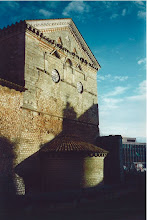Silence
“When anyone is disturbed or saddened under the pretext of a good and soul-profiting matter, and is angered against his neighbor, it is evident that this is not according to God: for everything that is of God is peaceful and useful and leads a man to humility and to judging himself.” -- St. Barsanuphius the Great
“If you are praised, be silent. If you are scolded, be silent. If you incur losses, be silent. If you receive profit, be silent. If you are satiated, be silent. If you are hungry, also be silent. And do not be afraid that there will be no fruit when all dies down; there will be! Not everything will die down. Energy will appear; and what energy!” -- St. Feofil, the Fool for Christ
"So when they had dined, Jesus saith to Simon Peter, Simon, [son] of Jonas, lovest thou me more than these? He saith unto him, Yea, Lord; thou knowest that I love thee. He saith unto him, Feed my lambs." Gospel of St. John 21:15
"10 In this the children of God and the children of the devil are manifest: Whoever does not practice righteousness is not of God, nor is he who does not love his brother. 11 For this is the message that you heard from the beginning, that we should love one another, 12 not as Cain who was of the wicked one and murdered his brother. And why did he murder him? Because his works were evil and his brother's righteous.
13 Do not marvel, my brethren, if the world hates you. 14 We know that we have passed from death to life, because we love the brethren. He who does not love his brother abides in death. 15 Whoever hates his brother is a murderer, and you know that no murderer has eternal life abiding in him.
16 By this we know love, because He laid down His life for us. And we also ought to lay down our lives for the brethren. 17 But whoever has this world's goods, and sees his brother in need, and shuts up his heart from him, how does the love of God abide in him?
18 My little children, let us not love in word or in tongue, but in deed and in truth. 19 And by this we know that we are of the truth, and shall assure our hearts before Him. 20 For if our heart condemns us, God is greater than our heart, and knows all things. 21 Beloved, if our heart does not condemn us, we have confidence toward God. 22 And whatever we ask we receive from Him, because we keep His commandments and do those things that are pleasing in His sight. 23 And this is His commandment: that we should believe on the name of His Son Jesus Christ and love one another, as He gave us commandment." 1 John 3:10-23.
I have a lot to learn.
“If you are praised, be silent. If you are scolded, be silent. If you incur losses, be silent. If you receive profit, be silent. If you are satiated, be silent. If you are hungry, also be silent. And do not be afraid that there will be no fruit when all dies down; there will be! Not everything will die down. Energy will appear; and what energy!” -- St. Feofil, the Fool for Christ
"So when they had dined, Jesus saith to Simon Peter, Simon, [son] of Jonas, lovest thou me more than these? He saith unto him, Yea, Lord; thou knowest that I love thee. He saith unto him, Feed my lambs." Gospel of St. John 21:15
"10 In this the children of God and the children of the devil are manifest: Whoever does not practice righteousness is not of God, nor is he who does not love his brother. 11 For this is the message that you heard from the beginning, that we should love one another, 12 not as Cain who was of the wicked one and murdered his brother. And why did he murder him? Because his works were evil and his brother's righteous.
13 Do not marvel, my brethren, if the world hates you. 14 We know that we have passed from death to life, because we love the brethren. He who does not love his brother abides in death. 15 Whoever hates his brother is a murderer, and you know that no murderer has eternal life abiding in him.
16 By this we know love, because He laid down His life for us. And we also ought to lay down our lives for the brethren. 17 But whoever has this world's goods, and sees his brother in need, and shuts up his heart from him, how does the love of God abide in him?
18 My little children, let us not love in word or in tongue, but in deed and in truth. 19 And by this we know that we are of the truth, and shall assure our hearts before Him. 20 For if our heart condemns us, God is greater than our heart, and knows all things. 21 Beloved, if our heart does not condemn us, we have confidence toward God. 22 And whatever we ask we receive from Him, because we keep His commandments and do those things that are pleasing in His sight. 23 And this is His commandment: that we should believe on the name of His Son Jesus Christ and love one another, as He gave us commandment." 1 John 3:10-23.
I have a lot to learn.

